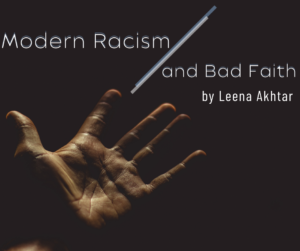Modern Racism and Bad Faith

A couple of years ago, a meme made the rounds that crystalized the notion of bad faith for me. It compared British press coverage of Kate Middleton to that of Meghan Markle. Two headlines accompanied rather similar-looking photos of the two pregnant women. “There She Glows: Pregnant Kate cradles her burgeoning baby bump as she waves to crowds,” contrasted jarringly with “Gone Gaga: Meghan Markle’s constant bump holding is ‘just for a photo op and she should take her “Baby Bump Barbie” act down a notch,’ critic claims.” Another set of headlines read, “Kate’s morning sickness cure? Prince William gifted with an avocado for pregnant Duchess,” and “Meghan Markle’s beloved avocado linked to human rights abuse and drought, millennial shame.” On their wedding flowers: “Why you can always say it with flowers,” for Middleton contrasted with, “How Meghan Markle’s flowers may have put Princess Charlotte’s life at risk.” The list continues, to depressing length.
A double-standard? Perhaps, on the face of it– but there’s more to it than that. It’s not so much that the two women were being held to different standards. The truth is that there is only one standard, and only one of the women met it. The other fell short and was castigated for it. None of the so-called critics seemed comfortable coming out and saying they didn’t like Meghan Markle because she was black. Instead, they managed to find fault with pretty much everything she did, but not with Kate Middleton when she did exactly the same things. Clearly, it’s not about these critics’ earnest or sincerely held feelings about avocados, the women’s tactile relationships to their baby bumps, or the flowers at their weddings. It’s about prejudice, anti-blackness, and rejection of difference, and in the examples above, rather clumsy attempts to dress them up in respectable clothing.
One of VISIONS ‘s core frameworks, about Modern Oppression, focuses on how the -isms (racism, sexism, etc.) can show up in behavior of people who may not be overtly bigoted, but still perpetuate the impacts of oppression. In this model, VISIONS lays out five behaviors that even well-intentioned people can engage in that have negative, harmful, and discriminatory impacts.
The final point is the most substantive. It reads “Not acknowledging the political significance of difference.” Ignorance is one thing; many people, once they come to know better, want to do better. I’m not talking about that. Bad faith is seeing, and then intentionally ignoring or denying, the political significance of difference. Arguing with evidence that props up one worldview while ignoring evidence that contradicts it is bad faith. Denying people rights, recognition, or autonomy for ostensibly non-ism related reasons is bad faith.
Several thousand Haitian migrants seeking asylum were recently deported to Haiti without being offered asylum hearings. Photos of border protection agents striking people from horseback with implements that looked a lot like whips to prevent them from crossing the Rio Grande caused an outcry. In a moment of historical reckoning in the United States, the images were hard to ignore. The photos visually evoked the centuries-long legacy of white-on-black violence in the US: slave patrols, overseers, and even the early days of Border Patrol, which was founded during a period when anti-immigrant sentiment ran high to keep certain people out of the country.
But were they actually using whips? A fierce debate ensued about this question. It turns out that they were long horse reins, cords being wielded similarly to a lariat– the lassos cowboys are often depicted using for tethering or to catch livestock (as if this is somehow less grotesque). Fixating on whether an implement is technically whip when it’s being used by white enforcers on horseback to strike black people is the epitome of bad faith. What happens if we follow the logic through? Let’s game it out.
Theoretically, if it’s not a whip, then it’s not so bad, is it? The reins were “whip-like cords,” as many media outlets are now being careful to state, but not whips. Whips would be awful, so let’s get clear on this, make sure everyone knows that they’re not whips. And while we’re fixated on the (definitely not) whips, we can make sure we’re not talking about the long legacy of economic extortion and external political interference that helped plunge Haiti into centuries of poverty after it attained independence, the decades-long history of discriminatory treatment of Haitian migrants by the US, or the fact that people who were sent back have been denied asylum hearings that they have a legal right to under US and international law in a continuance of a xenophobic policy instituted by the previous administration. Let’s also not talk about the racist origins of the US Border Patrol, or how many of their early officers were drawn from the ranks of the KKK and the Texas Rangers, or about its long history of institutionalized, and now increasingly militarized, racism, or about who might find that kind of work appealing. By all means, let’s keep talking about the (not!!) whips.
I’ve stopped engaging with disingenuous debates in good faith. 
Bad faith skirts the line between the old fashioned and modern -isms. The impulses that underpin the examples above are rooted in old-fashioned racism that cannot be admitted to out loud, at least not in public. And, in using reasonable-sounding proxies as cover, racism can take on a patina of legitimacy while still having profoundly hurtful and destructive results.
By Leena Akhtar, VISIONS consultant.
